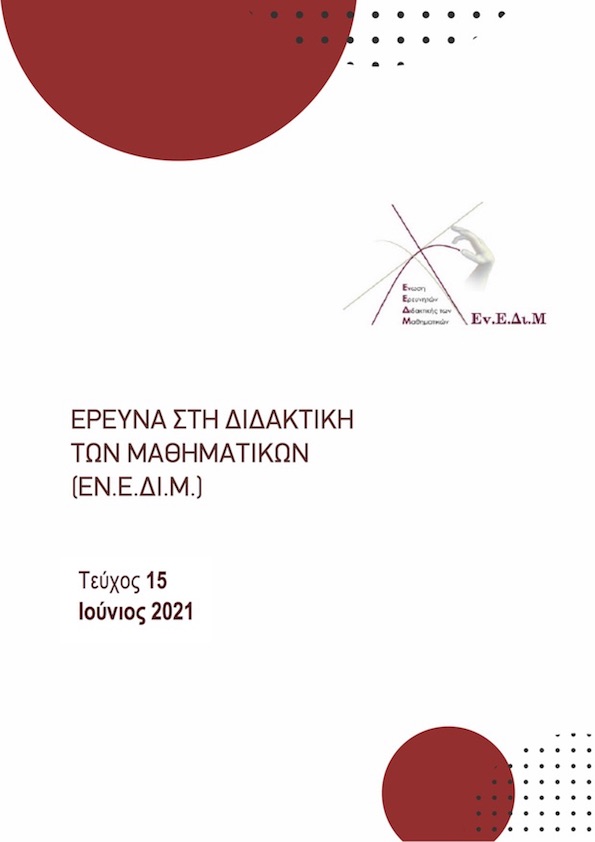ΕΠΑΓΓΕΛΜΑΤΙΚΗ ΑΝΑΠΤΥΞΗ ΕΚΠΑΙΔΕΥΤΙΚΩΝ ΤΗΣ ΠΡΩΤΟΒΑΘΜΙΑΣ ΕΚΠΑΙΔΕΥΣΗΣ ΣΤΑ ΜΑΘΗΜΑΤΙΚΑ ΣΤΟ ΠΛΑΙΣΙΟ ΜΙΑΣ ΚΟΙΝΟΤΗΤΑΣ ΠΡΑΚΤΙΚΗΣ

Περίληψη
Η παρούσα έρευνα αποσκοπεί στη μελέτη των δυνατοτήτων επαγγελματικής ανάπτυξης εκπαιδευτικών της πρωτοβάθμιας εκπαίδευσης στα μαθηματικά, στο πλαίσιο μιας κοινότητας πρακτικής, η οποία συγκροτήθηκε και λειτούργησε κατά τη διάρκεια του σχολικού έτους 2017-2018, σε ένα πειραματικό σχολείο της Βόρειας Ελλάδας. Στην κοινότητα πρακτικής συμμετείχαν 10 εκπαιδευτικοί και δύο ερευνητές της διδακτικής των μαθηματικών. Για τη ‘μελέτη περίπτωσης’ της κοινότητας πρακτικής αξιοποιήθηκε η θεωρία του Wenger. Τα αποτελέσματα της έρευνας έδειξαν ότι η συνεργασία με τους ερευνητές και με την εκπαιδευτικό-ερευνήτρια, που λειτούργησε ως διευκολύντρια (facilitator) στο πεδίο, διευκόλυνε τον αναστοχασμό των εκπαιδευτικών, έδωσε διεξόδους στους προβληματισμούς και τα διδακτικά διλήμματα που καθημερινά αντιμετώπιζαν κατά τη διδασκαλία των μαθηματικών.
Λεπτομέρειες άρθρου
- Πώς να δημιουργήσετε Αναφορές
-
Πετρίδου (Antonia Petridou) Α. (2021). ΕΠΑΓΓΕΛΜΑΤΙΚΗ ΑΝΑΠΤΥΞΗ ΕΚΠΑΙΔΕΥΤΙΚΩΝ ΤΗΣ ΠΡΩΤΟΒΑΘΜΙΑΣ ΕΚΠΑΙΔΕΥΣΗΣ ΣΤΑ ΜΑΘΗΜΑΤΙΚΑ ΣΤΟ ΠΛΑΙΣΙΟ ΜΙΑΣ ΚΟΙΝΟΤΗΤΑΣ ΠΡΑΚΤΙΚΗΣ. Έρευνα στη Διδακτική των Μαθηματικών, (15), 81–107. https://doi.org/10.12681/enedim.23058
- Ενότητα
- Νέοι Ερευνητές

Αυτή η εργασία είναι αδειοδοτημένη υπό το CC Αναφορά Δημιουργού 4.0.
Οι συγγραφείς των άρθρων που δημοσιεύονται στο περιοδικό διατηρούν τα δικαιώματα πνευματικής ιδιοκτησίας επί των άρθρων τους, δίνοντας στο περιοδικό το δικαίωμα της πρώτης δημοσίευσης. Άρθρα που δημοσιεύονται στο περιοδικό διατίθενται με άδεια Creative Commons BY και σύμφωνα με την άδεια μπορούν να χρησιμοποιούνται ελεύθερα, με αναφορά στο/στη συγγραφέα και στην πρώτη δημοσίευση.

